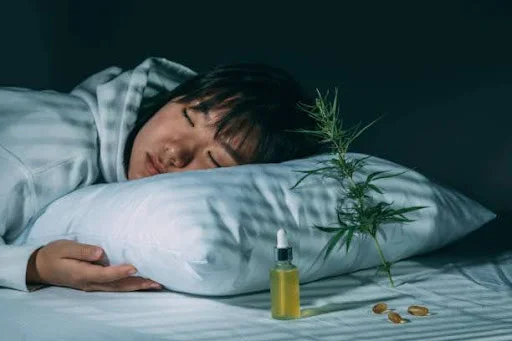These days, getting decent sleep can feel like winning the lottery. For some people, drifting off at night is effortless. For others, it means staring at the ceiling at 2 a.m., wondering if the brain has an “off” switch.
That is where the connection between cannabis and sleep has been gaining attention. Not as a magic cure, but as a possible tool to help the body and mind wind down, fall asleep faster, and stay asleep longer. With legal access through weed delivery sacramento services, many people find it easier to try different products and discover what works for them. While research is still evolving, many people, especially those dealing with sleep problems linked to anxiety, chronic pain, or stress, report noticeable improvements after introducing cannabis into their nighttime routine.
There’s so much more to discover—browse our related posts!
Why Quality Sleep Matters
When you finally fall asleep, the body does not just “power down.” This is when repair work begins. Muscles recover, memories are stored, and your mood resets. If your sleep is cut short or is low in quality, it affects more than just how tired you feel the next day.
Poor sleep can lead to:
- Lower immunity and slower recovery from illness
- Irritability and mood swings
- Trouble focusing and remembering details
- Feeling mentally and physically drained all the time
Consistently getting less than 7 to 8 hours can also impact long-term health, increasing the risk of heart problems, weight gain, and even depression.
How Cannabis Interacts with Sleep
Cannabis contains more than 100 compounds called cannabinoids, but two of the most researched are tetrahydrocannabinol (THC) and cannabidiol (CBD). These compounds interact with the endocannabinoid system (ECS), a network in the body that helps regulate mood, stress, pain, and sleep cycles.
- THC – Known for its psychoactive effects, THC may help people fall asleep faster. However, high doses can cause grogginess or disrupt sleep architecture over time.
- CBD – Non-intoxicating and widely studied for its calming and anti-anxiety properties. CBD may ease physical discomfort and mental restlessness, supporting more restful sleep.
When used thoughtfully, cannabis can act as a natural sleep aid. For some, it shortens the time it takes to drift off and lengthens deep, restorative sleep stages.
As interest in sleep-supporting cannabinoids grows, some users also explore less common options like THC-A, which may offer unique effects when heated or consumed in specific forms. Browsing reputable sources to shop exotic THC-A online can help consumers compare strain profiles, potencies, and product formats, allowing them to make more informed choices based on their personal sleep needs.
The Role of CBD in Sleep Support
CBD has a calming, balancing effect for many users. If your mind tends to race at night, CBD may help slow down mental activity so the body can relax. Unlike many prescription sleep aids, moderate CBD use does not usually leave you with a heavy “sleep hangover” the next morning.
Some people prefer CBD-only products for their gentle unwinding effect. Others choose a combination:
- THC for sedation
- CBD to balance the high and reduce next-day drowsiness
If chronic pain keeps you tossing and turning, CBD’s potential anti-inflammatory and analgesic effects may make it easier to find a comfortable sleeping position and stay asleep.
Cannabis, Sleep Cycles, and Research Insights
Research suggests THC can reduce the time it takes to fall asleep, especially for people with insomnia or other sleep disturbances. However, heavy or long-term use of high-THC strains may reduce REM sleep, the stage where dreaming occurs and emotional processing happens.
CBD appears to encourage deeper non-REM sleep without significantly reducing REM stages. That said, results can vary based on:
- Strain type
- Cannabinoid ratios
- Timing and dosage
- Method of consumption
Timing is important. Taking cannabis right before bed might leave some feeling groggy in the morning. Consuming it an hour or two before sleep may promote relaxation while minimizing next-day drowsiness. This applies whether you are using edibles, tinctures, or inhalation methods.
Choosing the Right Cannabis Product for Sleep
The type of strain and delivery method make a big difference in results.
Strain types:
- Indica strains – Typically relaxing and sedating, ideal for nighttime.
- Sativa strains – More energizing, better for daytime use.
- Hybrids – Effects vary depending on the balance of indica and sativa genetics.
Methods of consumption:
- Edibles – Take 30 to 90 minutes to kick in, effects last through the night.
- Tinctures – Absorb faster when placed under the tongue.
- Vaping or smoking – Immediate onset, best for falling asleep quickly.
If you live in California, legal cannabis delivery makes exploring options much easier. For example, weed delivery services allow you to try different CBD and THC products without spending hours visiting multiple dispensaries.
Things to Keep in Mind Before Using Cannabis for Sleep
Cannabis can be a helpful sleep tool, but it is not a magic solution and should be used mindfully.
Important considerations:
- Avoid overuse, as it can lead to dependency.
- High THC doses may cause morning grogginess or impact dream quality.
- Cannabis can interact with certain medications; check with a healthcare professional.
- Good sleep hygiene still matters; consistent bedtimes, reducing blue light exposure, and managing stress are key.
Pairing cannabis with healthy habits increases the likelihood of better sleep outcomes.
Practical Tips for Trying Cannabis for Sleep
If you decide to explore cannabis as part of your nighttime routine, follow these steps:
- Start low and go slow – Begin with a small dose and adjust gradually.
- Track your results – Keep a journal of strains, dosage, timing, and how you felt the next day.
- Experiment with timing – Try consuming cannabis 60 to 90 minutes before bed to find your sweet spot.
- Prioritize quality products – Look for lab-tested cannabis from licensed retailers or trusted weed delivery.
- Balance cannabinoids – Experiment with CBD-only, THC-only, or balanced products to see what works best for you.
Bottom Line
For many people, adding CBD or a balanced THC-CBD product to their nightly routine can make the difference between lying awake for hours and getting a full night’s rest. For others, the effects might be mild or inconsistent.
The key is mindful experimentation: start small, pay attention to how your body responds, and pair cannabis use with other healthy sleep practices. While it is not a one-size-fits-all answer, cannabis for sleep can be a valuable part of a holistic approach to better rest, especially when sourced safely and used in moderation.
Don’t miss out on more great reads—click through our featured posts!







